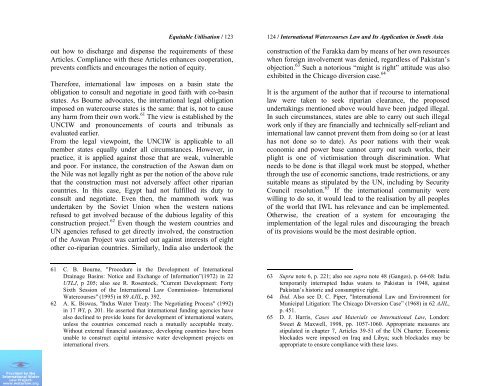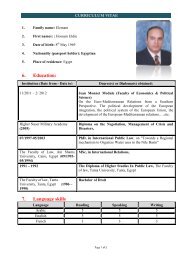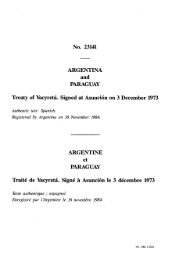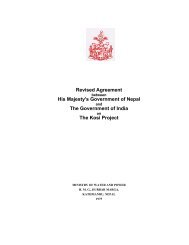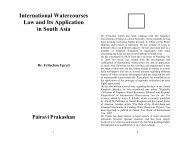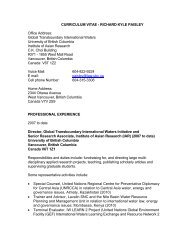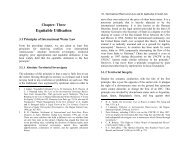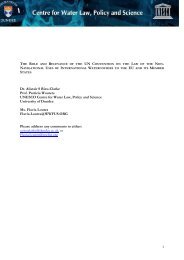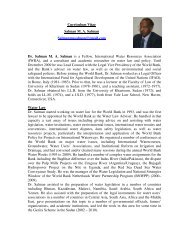Upreti, Trilochan, International Watercourses Law and Its Application ...
Upreti, Trilochan, International Watercourses Law and Its Application ...
Upreti, Trilochan, International Watercourses Law and Its Application ...
You also want an ePaper? Increase the reach of your titles
YUMPU automatically turns print PDFs into web optimized ePapers that Google loves.
Equitable Utilisation / 123 124 / <strong>International</strong> <strong>Watercourses</strong> <strong>Law</strong> <strong>and</strong> <strong>Its</strong> <strong>Application</strong> in South Asiaout how to discharge <strong>and</strong> dispense the requirements of theseArticles. Compliance with these Articles enhances cooperation,prevents conflicts <strong>and</strong> encourages the notion of equity.Therefore, international law imposes on a basin state theobligation to consult <strong>and</strong> negotiate in good faith with co-basinstates. As Bourne advocates, the international legal obligationimposed on watercourse states is the same: that is, not to causeany harm from their own work. 61 The view is established by theUNCIW <strong>and</strong> pronouncements of courts <strong>and</strong> tribunals asevaluated earlier.From the legal viewpoint, the UNCIW is applicable to allmember states equally under all circumstances. However, inpractice, it is applied against those that are weak, vulnerable<strong>and</strong> poor. For instance, the construction of the Aswan dam onthe Nile was not legally right as per the notion of the above rulethat the construction must not adversely affect other ripariancountries. In this case, Egypt had not fulfilled its duty toconsult <strong>and</strong> negotiate. Even then, the mammoth work wasundertaken by the Soviet Union when the western nationsrefused to get involved because of the dubious legality of thisconstruction project. 62 Even though the western countries <strong>and</strong>UN agencies refused to get directly involved, the constructionof the Aswan Project was carried out against interests of eightother co-riparian countries. Similarly, India also undertook theconstruction of the Farakka dam by means of her own resourceswhen foreign involvement was denied, regardless of Pakistan’sobjection. 63 Such a notorious “might is right” attitude was alsoexhibited in the Chicago diversion case. 64It is the argument of the author that if recourse to internationallaw were taken to seek riparian clearance, the proposedundertakings mentioned above would have been judged illegal.In such circumstances, states are able to carry out such illegalwork only if they are financially <strong>and</strong> technically self-reliant <strong>and</strong>international law cannot prevent them from doing so (or at leasthas not done so to date). As poor nations with their weakeconomic <strong>and</strong> power base cannot carry out such works, theirplight is one of victimisation through discrimination. Whatneeds to be done is that illegal work must be stopped, whetherthrough the use of economic sanctions, trade restrictions, or anysuitable means as stipulated by the UN, including by SecurityCouncil resolution. 65 If the international community werewilling to do so, it would lead to the realisation by all peoplesof the world that IWL has relevance <strong>and</strong> can be implemented.Otherwise, the creation of a system for encouraging theimplementation of the legal rules <strong>and</strong> discouraging the breachof its provisions would be the most desirable option.61 C. B. Bourne, "Procedure in the Development of <strong>International</strong>Drainage Basins: Notice <strong>and</strong> Exchange of Information”(1972) in 22UTLJ, p 205; also see R. Rosentock, "Current Development: FortySixth Session of the <strong>International</strong> <strong>Law</strong> Commission- <strong>International</strong><strong>Watercourses</strong>" (1995) in 89 AJIL, p. 392.62 A. K. Biswas, "Indus Water Treaty: The Negotiating Process" (1992)in 17 WI, p. 201. He asserted that international funding agencies havealso declined to provide loans for development of international waters,unless the countries concerned reach a mutually acceptable treaty.Without external financial assistance, developing countries have beenunable to construct capital intensive water development projects oninternational rivers.63 Supra note 6, p. 221; also see supra note 48 (Ganges), p. 64-68: Indiatemporarily interrupted Indus waters to Pakistan in 1948, againstPakistan’s historic <strong>and</strong> consumptive right.64 Ibid. Also see D. C. Piper, "<strong>International</strong> <strong>Law</strong> <strong>and</strong> Environment forMunicipal Litigation: The Chicago Diversion Case” (1968) in 62 AJIL,p. 451.65 D. J. Harris, Cases <strong>and</strong> Materials on <strong>International</strong> <strong>Law</strong>, London:Sweet & Maxwell, 1998, pp. 1057-1060. Appropriate measures arestipulated in chapter 7, Articles 39-51 of the UN Charter. Economicblockades were imposed on Iraq <strong>and</strong> Libya; such blockades may beappropriate to ensure compliance with these laws.


